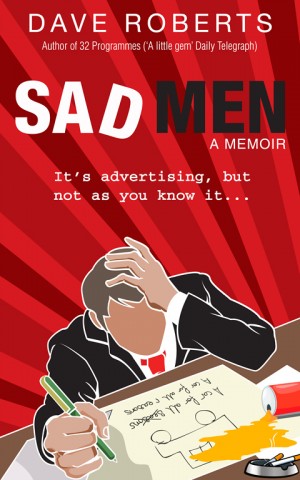You have no items in your cart. Want to get some nice things?
Go shopping It’s certainly canny marketing that the title of Dave Roberts’ memoir of his time in the advertising world self-deprecatingly plays on Mad Men – the hit TV series zeroes in on the very lifestyle that Roberts pursues but is ultimately unable to realize. The more you read of this engaging and frequently funny book, however, the more disingenuous this approach to Roberts’ story seems. Though he does show a different side of the industry, describing Sad Men as “a cautionary tale of a quest for advertising immortality” (as the book’s promotional material announces) doesn’t quite get to the heart of the matter.
It’s certainly canny marketing that the title of Dave Roberts’ memoir of his time in the advertising world self-deprecatingly plays on Mad Men – the hit TV series zeroes in on the very lifestyle that Roberts pursues but is ultimately unable to realize. The more you read of this engaging and frequently funny book, however, the more disingenuous this approach to Roberts’ story seems. Though he does show a different side of the industry, describing Sad Men as “a cautionary tale of a quest for advertising immortality” (as the book’s promotional material announces) doesn’t quite get to the heart of the matter.
That heart, rather, lies in nostalgia. In addition to being one of the main points of thematic crossover with the TV drama, it also provides Roberts’ book with its own unique selling point. Don Draper’s product presentation at the end of the first series revolves around his personal definition of nostalgia – the scene is filmed in such a way as to make the idea far more relevant to the characters themselves than to any professional investment they might have in the product. The product is there, but it’s of secondary importance. In Sad Men, Roberts flips this balance.
As I waited for the kettle to boil… my thoughts drifted back to the time when PG Tips put me on a path that would shape my life, where adverts would dictate much of what I did, and the desire to be a part of the world that created them would become an all-encompassing obsession.
Although clearly entranced by the lifestyle of advertising execs at Saatchi & Saatchi, and envious of his friend Jon who started there as a junior (“In my world, this was like having a friend who played for Manchester United. Or sang with Showaddywaddy”), Roberts wants to be a part of that world primarily because of what it creates and not just because of any financial or social rewards. He comes across, unexpectedly, as every inch the struggling artist, and his story is more relatable as a result.
As he progresses from Leeds to Manchester to New Zealand, his focus remains on producing the best work that he can within his chosen medium. And, whenever he fails, or falls short of the standards set by his idols (Geoff Seymour, Charles Saatchi, Jeff Stark), though the results are often sadly amusing, there is an undertone of bitter self-recrimination, which only makes these moments more poignant.
Indeed, what is most surprising about the book, and the “obsession” detailed within, is just how moving and sympathetic it proves. There’s a tendency to think of advertising as an intensely cynical industry (certainly an idea enhanced by the cut-throat office politics of Mad Men), based upon a need to exploit and deceive potential customers in order to sell a product at any cost. But what Roberts’ story illustrates is that there is often an artistic impulse and integrity at play as well – one that is easily wounded, but also openly joyful when a campaign hits its mark. More than this, Sad Men takes one of the bugbears of contemporary entertainment, product placement, and uses it in the most sincere and even heartfelt fashion I’ve ever encountered.
I entered the creative department. Looking around, I saw a dozen of the scruffiest, least attractive people I’d ever seen in a professional setting… I immediately felt at home.
Towards the end, Roberts muses on whether “life might have turned out better if I hadn’t pursued what turned out to be a stupid, impossible dream”. Yet, everything that comes before this, and, indeed, what follows, gives the lie to this being simply a cautionary tale. At times, it is more of a realist’s insider’s guide to the industry; at others, it is genuinely enlightening. Indeed, it is through his unflagging passion for this dream that he raises pertinent questions about the degree to which branded products, and the techniques employed to sell them, have shaped both our society and our individual identities and histories, and about whether, for good or ill, we take them too much for granted.
It is perhaps unfairly burdened by being marketed as the flip-side of a hugely popular TV show, but Sad Men is nevertheless an effective evocation of friendship, love, loss and painfully funny (though sometimes just painful) professional misfortune, whilst also serving as both an aficionado’s advert for advertising, and an endorsement of the more widely-relatable ethos of not giving up on life, no matter what.

About Dan Micklethwaite
Dan Micklethwaite lives and writes in West Yorkshire, UK, where he dedicates much of his spare time to the simple but consuming practice of avoiding the rain. His stories have featured or are forthcoming in BULL, 3:AM, NFTU, Emerge, Eunoia, Ink Sweat & Tears, and Birdville, among others. He's currently seeking representation/publication for a novel. More of his work can be found here: https://smalltimebooks.blogspot.co.uk/




